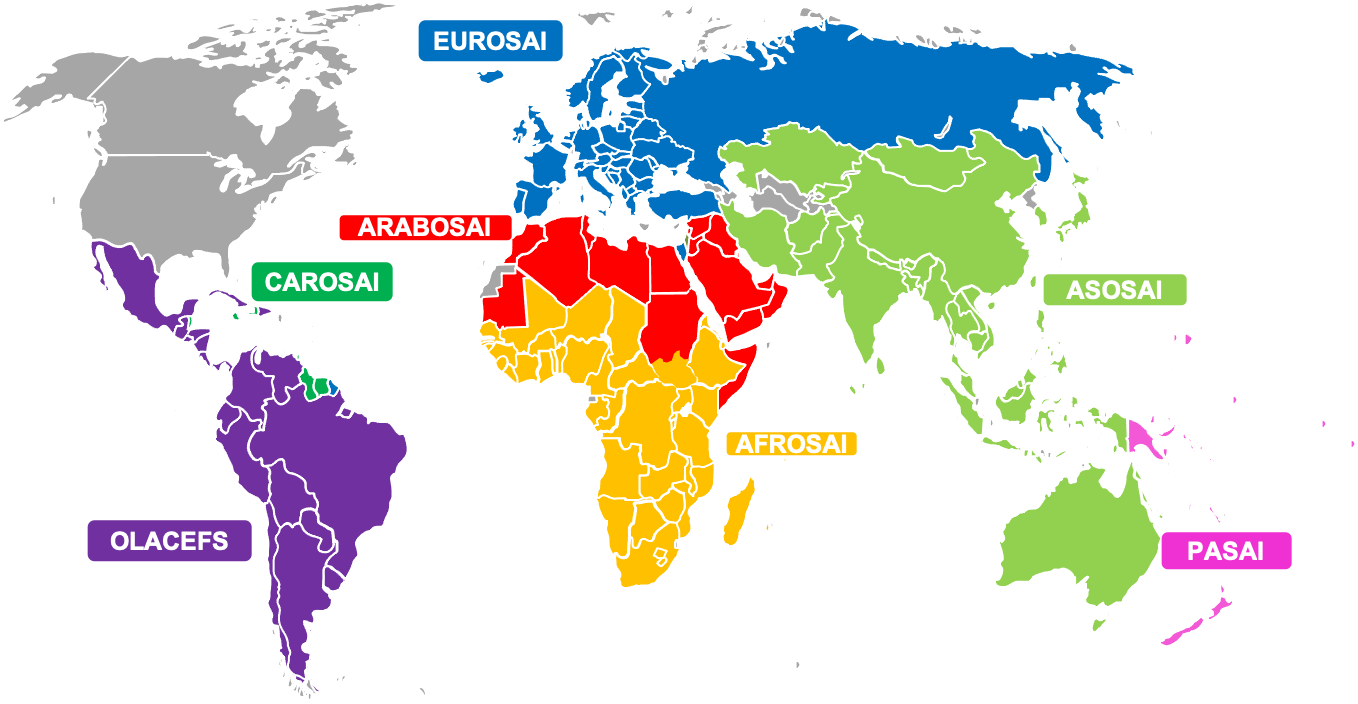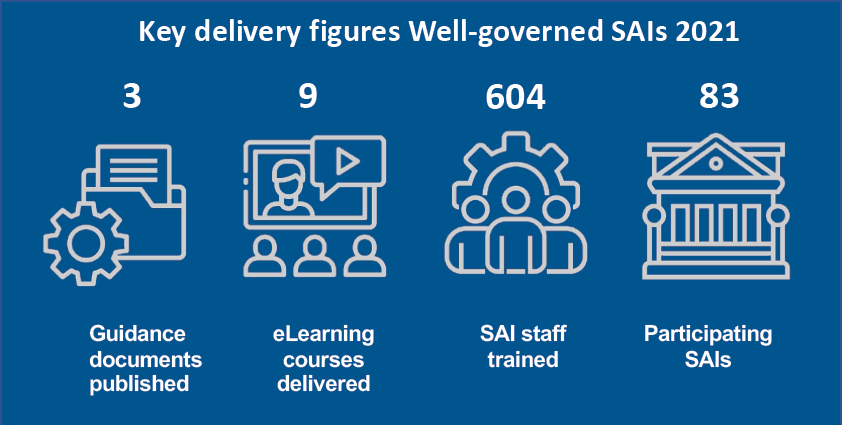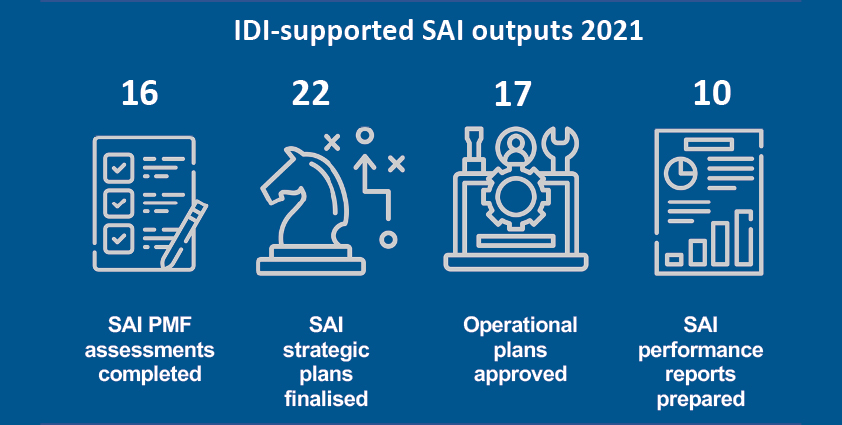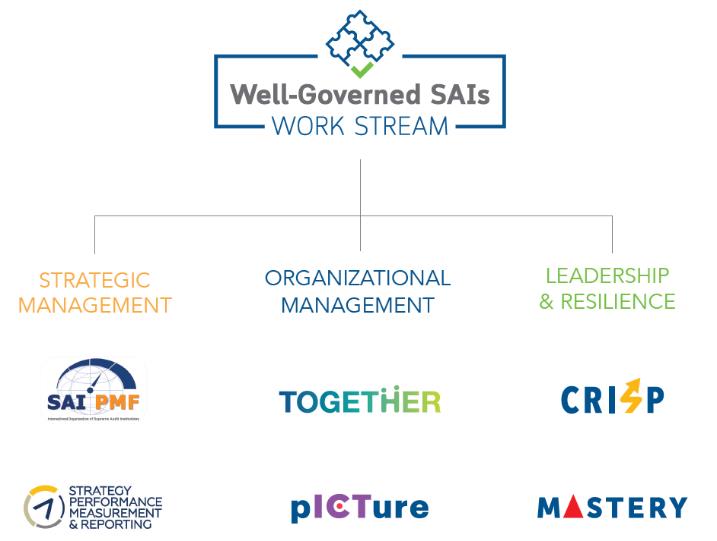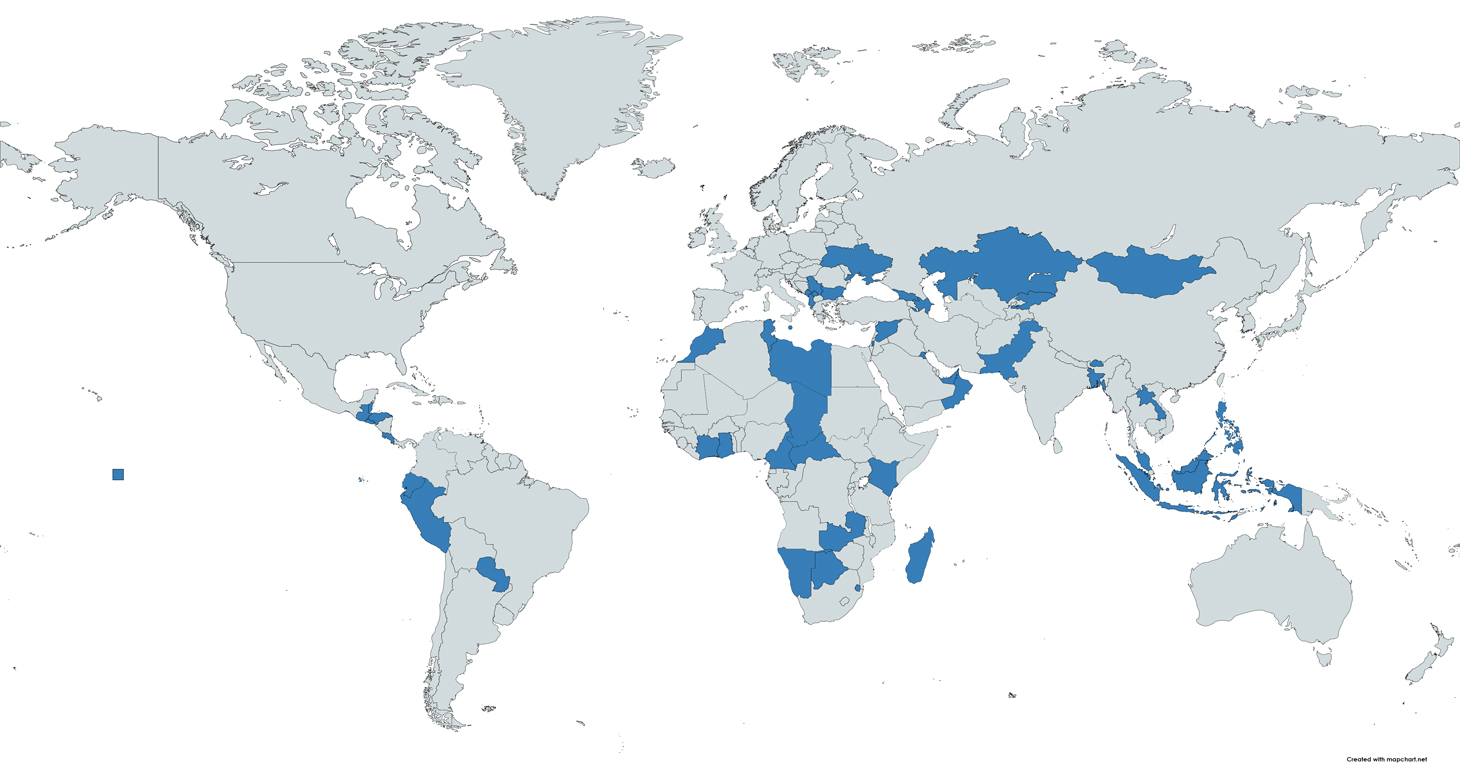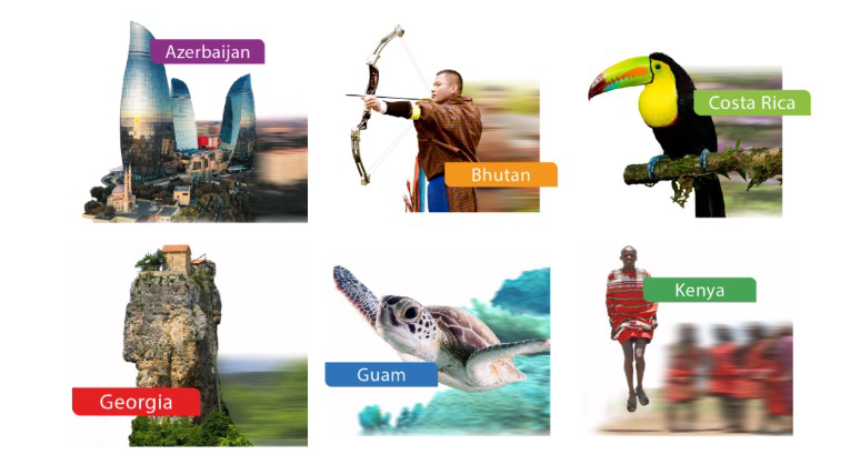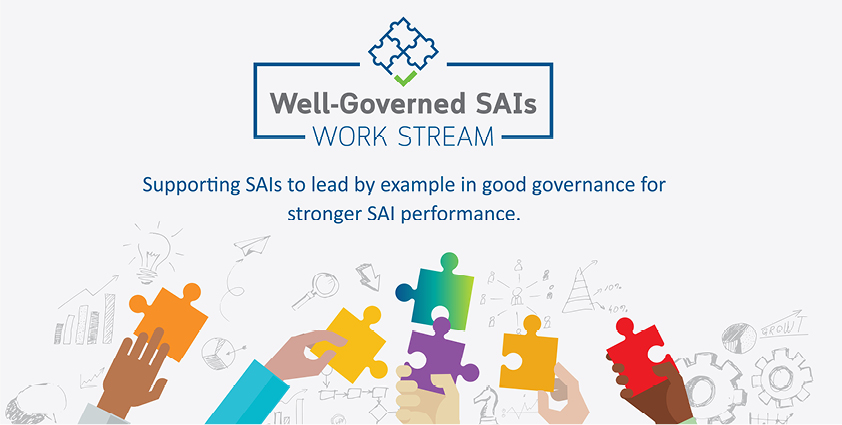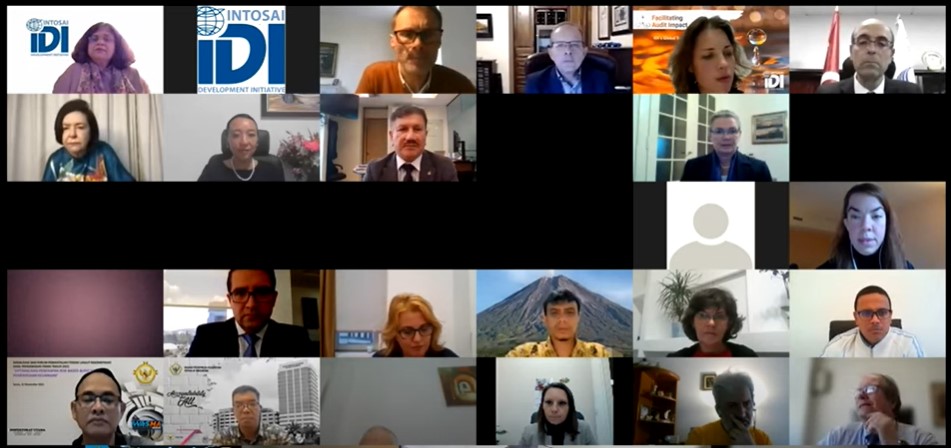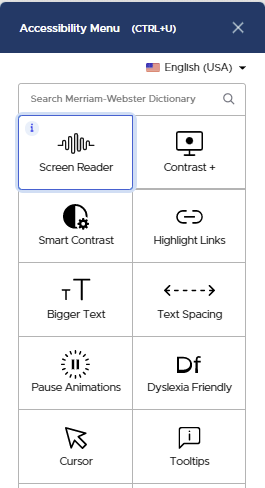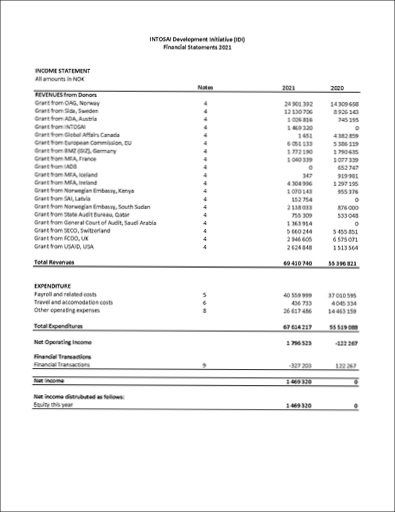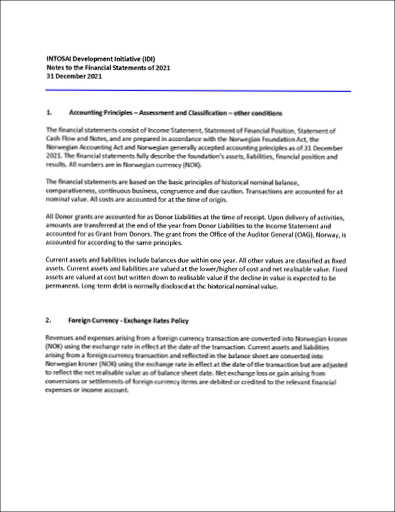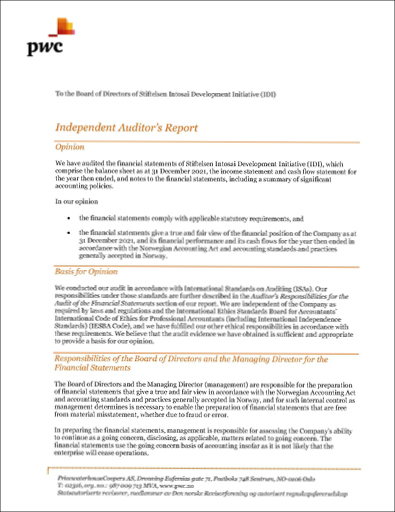Performance & Accountability
IDI REPORT 2021
HIGHLIGHTS
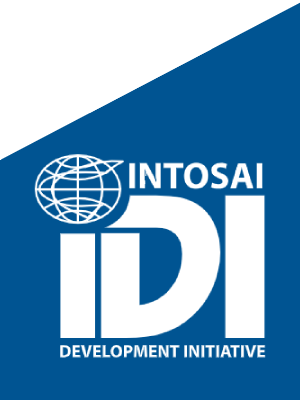
From the Director General’s Desk
The need for effective and resilient Supreme Audit Institutions (SAI) in ensuring accountability in crises and providing support and learning to governments in combating a global crisis was greater than ever in 2021. We at the INTOSAI Development Initiative (IDI) took the challenge head on to meet the emerging needs of SAIs in contributing to building back better.
With the strong support from our stakeholders in the INTOSAI community, donors and others, coupled with the continued resilience of my colleagues in the IDI, we managed to not only meet our targets but exceeded them in many areas.
Public spending in 2021 had the twin goals of disaster response and economic recovery, besides maintenance of citizen services. IDI’s portfolio of capacity development initiatives focused on supporting SAIs to strengthen them in providing transparency, accountability and inclusiveness in the focus areas of public spending. New initiatives were launched or expanded in the areas of ICT governance, leveraging technology, crisis and risk management, leadership, human resources, professional development and facilitating audit impact. We continued to deliver on the initiatives launched specifically in response to the pandemic in 2020 including supporting audits of Strong & Resilient National Public Health Systems linked to SDG indicator 3.d.; and Transparency, Accountability and Inclusiveness (TAI) audits in the use of emergency funding for COVID-19 to support SAIs to undertake agile compliance audits of emergency funding.
We reinforced our focus on strengthening the independence of SAIs while recognising the risk of the pandemic contributing to further democratic backsliding and challenges to SAI independence. During 2021, we also published the triennial Global Stocktaking Report (GSR). The results were widely circulated in the SAI community and beyond. Areas of concern were highlighted. These will guide our efforts for empowering SAIs going forward.
Recognising the need to enhance our own agility, foresight and resilience, we continued to enable ourselves. We concluded focussed recruitments to increase our capacity to deliver on our portfolios. We strengthened our IT systems and embraced technology both for our day-to-day interactions as well as to deliver on initiatives through digital education. Internal controls were enhanced through updates to policies and manuals. Regular training was facilitated to improve our internal capacity. Online engagements and group activities facilitated our mental and physical well-being during the tough times. In addition, in November 2021, as another step in our successful gender journey, we embarked on an assessment of our situation in human resources from a diversity, gender and intersectionality perspective. Early results show that IDI is a frontrunner in these areas. In 2022 and onwards, we will do everything to uphold this success story and improve where necessary.
The end of 2021 marks the end of another challenging year where I have continued to be amazed by how our staff and partners have worked together to deliver valuable support to the SAI community in the midst of a crisis. I would like to thank all our stakeholders for their support in 2021 and I look forward to our continued cooperation.


Global Support, Global Impact

145
SAIs participated in long-term IDI capacity development initiatives; 30 in standalone training initiatives; and 175 in knowledge sharing and awareness raising events

241
SAI teams supported through 17 long-term capacity development initiatives

4
SAIs provided long-term, holistic bilateral support, and 7 more provided strategic support to secure long-term partnerships

2900
SAI staff participated in IDI initiatives, including: 2,828 in long-term capacity development initiatives and 72 in standalone training initiatives

2831
Staff from SAIs and other stakeholders participated in knowledge sharing and awareness raising events

89
SAIs supported to integrate elements of inclusion and gender into their strategic plans and/or audits

34
SAIs in fragile and conflict affected situations participated in long-term IDI capacity development initiatives

2002
Days’ worth in-kind support provided by SAIs. 5 Strategic Partnerships working together to strengthen public external audit
TAKING STOCK OF SAI PERFORMANCE
The traditional mandate of SAIs has been to contribute to good governance, transparency, accountability, oversight over public funds and the fight against corruption. The broad canvas of SAIs’ operations reveals that 2021 was marked by efforts around the world to recover from the effects of the pandemic. Although the Official Development Assistance (ODA) touched an all-time high of USD 157 123 million1, multilateral recovery efforts such as facilitating global vaccine access and providing liquidity and debt relief to constrained economies were thwarted by health issues, supply disruptions and price pressures2. In this context, the SAI’s role assumed greater significance in maintaining credibility of fiscal policy while ameliorating the economic and social scenario.

The 2020 GSR brought out important facets of SAIs’ functioning and performance. While 2021 was marked by an all-time high figure of ODA in response to the pandemic, support to SAIs unfortunately has remained stagnant at 2016 levels. Global Foundations Unit (GFU) in IDI continued with its brokerage efforts notably in terms of launching the Global SAI Accountability Initiative (GSAI) to facilitate greater capacity development support to challenged SAIs.
GSR shows continued backsliding in terms of SAI independence across all but one of the principles of the Mexico declaration, and a clear correlation between SAI independence and levels of democracy. During 2021, military takeover of power also took place in a few countries in Africa and Asia. Independence concerns arise with the appointment of military leaders or military backed persons as heads of SAIs and their ability to execute the mandate of the SAIs is severely curtailed. IDI leveraged SAI Independence Rapid Advocacy Mechanism (SIRAM) to assess and respond to the threats received and issue official statements on independence concerns in Colombia, Cyprus, and Sierra Leone.
Regarding governance of SAIs, 92% of SAIs had Strategic Plans. However, only 10% have used a gender analysis to inform their strategic planning and only 57% report publicly against their strategic objectives. An increasing number of SAIs are undertaking SAI PMF assessments to monitor and improve their performance. IDI’s Strategy, Performance Measurement and Reporting (SPMR) initiative provided support to eight SAIs from three INTOSAI regions.
1. Source: https://data.oecd.org/oda/net-oda.htm
2. Source: World Economic Outlook, October 2021, International Monetary Fund

Increasingly SAIs are adopting the International Standards for Supreme Audit Institutions (ISSAIs). As per GSR 86% of SAIs reported they have adopted ISSAIs for their main audit streams. Formal adoption of the ISSAIs by a SAI does not mean that the SAI has ISSAI-compliant audit practices. While only 16% of SAIs report that they are fully ISSAI compliant, half of the SAIs perceive themselves as complying with most elements contained in the ISSAIs. ISSAI implementation is being hampered by weak systems and lack of resources. Supporting SAIs in implementing ISSAIs has been a priority for IDI for a decade now. While appreciable progress has been made, even greater efforts and commitment are required to internalise the standards in the SAIs’ processes and improve audit quality. For this however, SAIs need to have quality management systems in place. 37% of SAIs don’t have a system in place for monitoring the quality of any of the audit streams. While the use of ISSAIs increased, audit coverage has receded slightly for financial audit (FA) and performance audit (PA). It has however, increased slightly for compliance audit (CA). On a positive note, the percentage of audit reports being published by SAIs has shown an increase. Another matter of concern was that 35% of SAIs reported the absence of proper follow up of audits. Communication and involvement of stakeholders in follow-up is also limited. IDI’s Facilitating Audit Impact (FAI) initiative is supporting SAIs in this regard.
In specific context of the pandemic, GSR brought out that 53% of SAIs have an emergency preparedness and continuity plan. However, lower income countries are lagging. SAIs have undertaken various measures for responding to the pandemic. These include facilitation of staff to work from home (87% of SAIs) and revision of audit plan (70% of SAIs). 66% of SAIs have performed audits on COVID-19 related government funds. IDI’s bilateral support to SAIs operating in fragile situations helped them in their commitment in delivering in adversity during the year. Building up on the capacity development efforts, SAI Somalia published its annual audit reports. SAI South Sudan completed the audit of use of emergency funding provided by IMF and submitted its report to the President. COVID-19 related audits were completed by SAI Madagascar, and the reports are expected to be published in 2022.
PERFORMANCE AGAINST KEY IDI 2021 TARGETS
| Target | Result | ||||
|---|---|---|---|---|---|
| Global Outreach |
|
Number of SAIs participating in IDI initiatives in 2021 | 140 | 191 | |
| Independent SAIs |
|
Cumulative % of cases of threats to SAI independence referred to IDI to which IDI helped develop a coordinated stakeholder response to support the SAI, issued within 30 days of referral | 100% | 100% | |
| Well-Governed SAIs |
|
Cumulative number of SAIs with a finalised SAI performance report based on SAI PMF | 75 | 82 | |
| Professional SAIs |
|
Cumulative number of SAI Young Leader Graduates | 40 | 41 | |
| Relevant SAIs |
|
Cumulative number of SAIs supported by IDI which submit a cooperative audit report focused on the SDGs to relevant authorities | 60 | 62 | |
| Bilateral Support |
|
Cumulative number of SAIs in challenging environments supported bilaterally to conduct peer supported audits and disseminate findings | 4 | 3 | |
| Global Foundations |
|
Status of the SAI Global Stocktaking Report | Published | Published | |
| Inclusiveness & Gender |
|
Cumulative number of SAIs (supported by IDI) that have a target relating to gender in their strategic plans* * Harmonised with IDI Supported SAI Capacity and Output indicator 25 in IDI’s results framework for better comparison | 10 | 13 |
IDI WORK STREAMS

INDEPENDENT SAIs WORK STREAM
PERFORMANCE SNAPSHOT
- Broader Stakeholder Engagement
- Effective Use of Digital Channels
- Timely Response to Emerging Threats
- Publication of Knowledge Products
- Provision of Agile Support to SAIs
- Contributed to the IDC Goodwill Ambassador for SAI Independence Initiative
- Engaged with global networks of CSOs and PFM Organisations
- 20000+ downloads on the SIRC
- 2500+ visitors on the SIRC
- Communication material on SAI Independence
- Significant increase in the number of SIRAM cases received
- Improvement of the SIRAM based on user’s feedback
- Literature review on SAI Independence
- Study on the impact of Covid-19 on SAI Independence
- Targeted support to SAI Leadership through Mastery Initiative
- Enhanced country level support through greater synergies with other units
Agile advocacy to maintain SAI independence
|
Independence is crucial for effective and credible SAIs. Yet the more effective SAIs become, the more vested interests have to gain from undermining their independence. Data from the GSR 2020 shows that SAI independence has declined in recent years. At the same time, the demand for assistance to respond to threats to independence has increased. Country-level advocacy and support through the SIRAM constituted a key area of work for the Independence team in 2021. Responding to an increased number of requests coming from SAIs, the team provided advocacy support to several SAIs, leading to official statements of independence concern issued in Colombia, Cyprus, and Sierra Leone. In some cases, the initial engagement through SIRAM triggered requests for longer-term support to enhance SAI independence. The experiences gained in 2021 have contributed to consolidating the SIRAM as a key tool for addressing threats to SAI independence and demonstrated the importance of partnerships with donors and civil society actors for effective advocacy efforts at the country level. |
The potential of digital advocacy on SAI Independence
The use of digital channels to amplify the advocacy efforts on SAI Independence was strengthened by 1) the creation of a dedicated outlet, the SIRC, to establish a single point where users can access a wealth of resources on SAI Independence, 2) the active use of social media channels to disseminate information on SAI Independence.
2021 data shows that the creation of an independence centric outlet has generated significant traffic with 2500 unique visitors and more than 20 000 downloads, nearly a 400% increase in website traffic compared to the previous year.
Social media has also generated significant traffic, especially on rapid advocacy, as we have seen a greater engagement on SIRAM through twitter than through other channels both through impressions and subsequent engagement.
There is a clear correlation between social media posts and website traffic, with notable spikes in visits to the SIRC following Twitter posts publicizing the occasional paper series, such as study on the Impact of COVID-19 pandemic on SAI Independence.

WELL-GOVERNED SAIs WORK STREAM
A suite of SPMR and SAI PMF success stories illustrate the benefits of strong strategic management
Strategic management can be a challenging process. It requires an open mind, perseverance, leadership commitment, agility, and collaboration. The SAIs participating in IDI’s Strategy, Performance Measurement and Reporting (SPMR) initiative have proven in their own unique ways that they have both the capacity and a growing strategic management toolkit to successfully deal with even the harshest and most unexpected circumstances. To celebrate such experiences and achievements, in 2021 we brought out a suite of success stories, focusing on how SAIs have used the SAI Performance Measurement Framework (SAI PMF) and the SPMR methodology to achieve a wide range of both planned and unexpected positive changes.
The experiences of SAIs Bhutan and Costa Rica show how a repeat SAI PMF assessment can help SAIs measure progress and achieve improvements across strategic planning cycles. The stories of SAIs Azerbaijan and the Maldives (publication upcoming) illustrate how teams can persevere and achieve great results despite an array of additional challenges, such as changes in team composition and political turmoil. SAI leadership and commitment to excellence have been key to achieving strategic management results in SAIs Georgia, Guam, and Kenya.
The stories also demonstrate how participating in SPMR can have an amplifying effect as those involved take on new roles. Three of the SPMR resource persons and participants have moved on to become Auditor-General, Member of the SAI Board and Director of Strategic Planning department.
Successful completion of the all-digital SAI PMF facilitation programme in CAROSAI
The year-long collaboration between IDI and the Caribbean Organisation of Supreme Audit Institutions (CAROSAI) to facilitate the roll-out of the SAI PMF assessment tool in the region was successfully closed in July 2021. The facilitation programme provided support to four SAIs, namely Aruba, Belize, Dominica and St Lucia to carry out a holistic SAI PMF assessment.
The SAI PMF assessments were conducted as self-assessments. We provided continuous remote support to the entire assessment process by allocating a mentor to each team. This mode of delivering the facilitated programme resulted in high quality performance reports, as evidenced by the findings of the independent reviewers. All four SAIs completed the assessment in a year’s time, which is less than the average time for self-assessments.
The dedication demonstrated by SAI leadership and the assessment teams was exemplary. This combination of - continuous remote mentorship by IDI, SAI leadership support and the commitment of the assessment teams - were the key drivers for the successful completion of the regional facilitation programme.
The heads of SAIs are delighted to have the final independently reviewed SAI PMF reports. They have expressed their commitment to putting measures in place within their SAIs, to further strengthen areas where performance is good and close the gaps in the areas that need to be improved. Two of the SAIs, namely Aruba and St Lucia, have proceeded to take part in the new round of the SPMR initiative, thereby making continuous use of their SAI PMF assessment to strengthen strategic management.

PROFESSIONAL SAIs WORK STREAM
PERFORMANCE SNAPSHOT

- Wider Outreach
- Gender Balance & Inclusiveness
- Guidance for ISSAI Implementation
- Professional Education for SAI Auditors
- SYL Awards recognise innovation, transformation and collaboration
- TAI facilitates stakeholder engagements
- Increased in kind contribution
- SAIs from all INTOSAI regions participated.
- Strong growth in outreach with 3350 participants in 2021, compared to 612 in 2020
- Gender lens used in Professional Education for SAI Auditors Pilot, Transparency, Accountability and Inclusiveness of Use of Emergency Funding for COVID-19 audits, and Learning Festivals
- 48% female participants
- 73% participating SAIs from developing country context
- Up to date and quality assured ISSAI Compliance iCATS and ISSAI Implementation Handbooks available on IDI website
- TAI Practical guide and question banks published
- First of its kind PESA-P launched for more than 1,200 SAI staff from 86 SAIs
-
SAI Young Leaders (SYL) from SAIs of Costa Rica, Turkey and Jamaica won Innovative, Transformative and Collaborative SYL Awards.
-
TAI brought together SAI Leaders, SAI audit teams & stakeholders through meetings and social learning webinars on COVID 19 spending through emergency public procurements, socio economic packages and vaccine rollouts
-
In kind contribution increased from 2.09 million NOK in 2020 to 3.62 million NOK in 2021.
We started the SAI Young Leader’s (SYL) Award with the first cohort of SYLs in 2017-2018 to recognise growth, performance and contribution of an SYL. While the objective of the award remained the same for the second cohort, we wanted to focus on some distinct behaviours demonstrated by the SYL which contributed to the SAI or the SYL community. As such we decided to give away three, instead of one, SYL Awards!
Erick Alvarado Munoz from the SAI of Costa Rica won the Innovative SYL Award. As the name suggests, this is a tribute to innovation. Erick demonstrated an innovative mindset and out of box thinking by using coaching techniques in communicating with audited entities. Throughout the implementation of his project, he focused on exploring and experimenting with this new idea, learning lessons and working together with key stakeholders to implement his innovative idea in a way that showed results for SAI Costa Rica.
Emine Ersoz from SAI Turkey won the Transformative SYL Award: This award recognises the SYL’s change management skills and contribution to positive change in the SAI through their change initiatives. Emine demonstrated a clear vision and purpose for her change management strategy, she showed a clear grasp of different aspects of change management e.g. creating powerful coalitions and achieving quick wins. Her strategy made a visible difference to the communication practices of SAI Turkey by enhancing SAI Turkey’s social media presence, work with digital tools and identification and inclusion of stakeholder engagement in the audit process.
Nicaria Stewart from SAI Jamaica won the Collaborative SYL Award. For the first time, we gave an award to acknowledges the role of an SYL in fostering a vibrant and collaborative SYL community. Nicaria contributed substantially to the SYL community by playing leading roles in community work e.g. SYL committees, activities, SYL communications, SYL articles etc. Her care and concern for her team members, which was demonstrated by her attendance at most of their presentations, went beyond her officially recognized roles in the community.
We are thankful to Dasho Tashi, Auditor General of Bhutan, Ms. Silke Steiner, INTOSAI General Secretariat and Mr. Michael Hix, GAO for their enthusiastic, insightful and wise contributions as members of the panel of judges for these awards. Each award consists of a certificate, a medal and sponsorship for professional development.
The launch of the PESA-P was the biggest highlight of our support for ISSAI Implementation. PESA-P dreams of a global profession of SAI auditors contributing to professional SAIs. It is a uniquely INTOSAI solution - created by the community to address the needs of the community. It has shaped up to be what we wanted it to be - a credible, scalable, inclusive, and relevant professional development solution for SAIs. Given current times it is also an entirely digital solution.
We were delighted to see a huge response to PESA-P with 862 SAI auditors and 402 SAI coaches from 86 SAIs, as against a target of 600 SAI auditors. We have successfully created an entirely online education and reflection platform that provides for 170 hours of digital education, social learning, online resources, and an initial professional development portfolio. PESA-P education is delivered through 17 papers - two cross cutting papers and five papers for each of the audit streams (FA, PA, CA).
The design and development of high-quality digital education for the papers has proved to be challenging for several reasons, the pandemic being the main one. Responding to the situation we decided to launch the papers in a sequence. In 2021, we launched two cross cutting papers and two of the five audit stream papers for FA, PA and CA. We experimented with tools to encourage engagement, interaction and reflective thinking of learners - interactive live events featuring speakers from the SAI Community (21 live sessions from August to December), a SAI coach to provide support in the local environment, an Initial Professional Development Portfolio (IPDP) where the learners reflect on the application of the learning within their professional practice and plan for their professional growth beyond PESA-P, regular announcements informing learners of PESA-P activities, opportunities to ask questions and have them answered, and badges awarding achievement and progress through the education. We also supported the work of the SAI Coach with eight live sessions for coaches creating an opportunity to develop their coaching skills.
We also started work on the PESA-P assessments, with the development of the Assessment framework and procurement of the assessment platform. The PESA-P launch would not have been possible without the tremendous in-kind contribution from PESA Educators (221 person days), as well as other SAIs and resource persons who contributed to the live events. Learn about PESA-P HERE.

RELEVANT SAIs WORK STREAM
PERFORMANCE SNAPSHOT

- Wider Outreach
- Gender Balance & Inclusiveness
- Innovating for Impact
- Multi stakeholder engagement for auditing SDGs
- Enhanced capacity, accessibility and analytics for IDI LMS
- LOTA strategy to shape a digital future for SAIs
- Reimagining SAI audit impact
- SAIs from all INTOSAI regions participated
- A 38% increase in the number of participants provided capacity development support (300 in 2020 and 414 in 2021)
- Gender lens used in LOTA, Healthy Interactions and FAI Learning Festivals
- Enhanced accessibility features of IDI LMS
- 54 % female participants
- 67 % participating SAIs from developing country context
- 713 participants shared knowledge and experience on innovating for impact and other SAI innovations
-
Engagement of SAI leadership and SAI teams with external stakeholders like WHO, UN Women, sustainable procurement experts, IBP, audited entities, local CSOs brought new insights to the audits of SDGs implementation
- IDI LMS has the capacity to host an unlimited number of participants. 1717 new users accounts and 28 new virtual classrooms added in 2021
- Enhanced accessibility features like Moodle Accessibility toolkit and Userway widget available in IDI LMS
- Data Analytics to strengten the monitoring of large numbers of learners and data visualisation
- Two online workshops delivered for Healthy Interactions to enhance online facilitation skills
- LOTA strategy in place after extensive stakeholder consultation
- Focus on use of technology in audit & auditing use of technology by governments
- Tools, education, talks, exploration, communities and audit support for SAIs
- FAI strategy in place after extensive stakeholder consultation
- Focus on impact driven audits, robust follow up systems and strong stakeholder engagement
- A global summit on audit impact and reflections paper facilitate discussions on audit impact
Every SAI can contribute to positive effects on people and planet
We started 2021 with an attempt to formulate a wide and inclusive description of SAI audit impact.
‘SAI audit impact is the contribution of the SAI’s audit work to positive effects on people and planet (a society/on a group/area), especially those left behind, or at risk of being left behind.’
Hearing success stories narrated by leaders from SAIs across the world, confirmed our assumption that SAIs could and did create positive effects in different environments through their FA, PA and CA work. These effects ranged from deterrence, to urging governments to put in place appropriate accountability mechanism like financial statements, to contributing to service delivery, national outcomes and culture change in the public sector.
While 92 SAIs participated in these global conversations – 17 shared their impact success stories and key success factors.
Our conversations with multiple stakeholders throughout 2021, led to a number of reflections. We have captured these as a bunch of nine reflections in a reflections paper called ‘ Reimagining SAI Audit Impact’. The paper includes key reflections on the shared responsibility and ecosystem for audit impact, the need to strategise and build powerful coalitions for audit impact, the significance of follow up, the role of technology and innovative practices like coaching. Most importantly the paper recognizes that every SAI can contribute to audit impact and make a difference in its local context.
How can we make the IDI LMS more accessible and inclusive? In 2021 this was the question we sat with, even as the use of the IDI LMS and the number of learners on the LMS exploded!
Our experiments and exploration led us to a wider understanding of accessibility and inclusion. We understood that lack of access and exclusion can happen on many counts. All of these may not be recognized as disability. Learners may experience temporary disabilities such as a broken arm, lost glasses or older users who have difficulty reading small fonts. Learners could face situational limitations like a noisy or quiet environment, slow internet connection, lack of bandwidth, limited electricity. We may also have learners with more long-term disabilities like impaired vision, hearing or a cognitive disability such as dyslexia or an attention deficit disorder, impaired mobility with inability to use a computer mouse, keyboard or touchscreen and colour blindness. Besides the above-mentioned conditions, learners on the IDI LMS also have diverse learning preferences and learning styles, are in different time zones, with different language needs and variable access to technology.
As such accessibility and inclusion was about providing options to our learners to access content better.
How did we provide more options and better, more inclusive access?
- The New Moodle Accessibility toolkit is now available as a part of our new Moodle update. The Accessibility toolkit provides additional information about the text and lists any images or links. In addition, we have made available the Accessibility block, which will check the entire courseware material providing suggestions for improvements.
- Userway accessibility widget is available on the IDI LMS. UserWay is a cloud-based accessibility solution that creates a more accessible browsing experience for our learners while meeting standard requirements. Learners with some visual limitations can now adjust the text size on the LMS, highlight clickable areas, so they do not get lost among the other content, increase the mouse pointer’s size, and highlight links. Learners will also be able to activate the screen reader function, which supports screen readers for over 30 different languages.
- Customised Moodle App – As more learners use mobile devices for eLearning such as mobile phones and tablets, we have explored options for launching a branded IDI LMS app, available in Apple store and Google Play for free soon. This customised app will provide unlimited access to offline courses, push notifications and QR login, among other benefits.
We will continue to explore solutions which are essential for some but useful for all!

Bilateral support
PERFORMANCE SNAPSHOT
- Hybrid trainings for auditors in financial audit methodology and quality control, adressing quality assurance gaps
- Collaboration and joint trainings with the Federal Member States audit offices established through project support
- The SAI successfully conducted an audit on emergency funding by the IMF, with IDI and SAI Kenya support
- According to the IMF, the publication of the audit marks an important step towards greater fiscal transparency and accountability in the use of public finances
- The SAI did four audits related to COVID-19 funds and measures, with guidance of IDI and peers from SAIs Norway, France and Morocco
- To ensure connectivity, data security and more collaboration, ICT equipment and software was rolled-out
- The SAI launched its first simplified and more citizen friendly version of the annual audit report
- With technical support, the SAI submitted the first set in a series of audits of the Government’s COVID-19 response. The findings highlight a wide range of procurement, distribution and documentation issues
- All the nine supported SAIs have finalised 5-year strategic plans
- Most SAIs have mobilised long-term support for the successful implementation of the strategic plans
SAIs in challenging contexts demonstrate relevance in a time of crisis
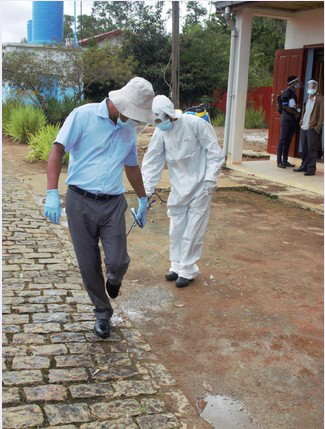
Madagascar, auditor preparing for inspecting Covid-19 local facilities.
SAI Gambia launched its first ever simplified audit report
Governments in challenging contexts have experienced severe fiscal situations during the pandemic, and many have received emergency funding from the IMF. Timely and quality audits are expected to safeguard the use of funds and hold government to account for implementing effective measures.
In South Sudan, the SAI successfully conducted an audit on utilization of a first round of emergency funding by the IMF. This was important for enabling additional funding to the salary arrears across the central and state-level government. The audit process was supported by IDI and peers from SAI Kenya. According to the IMF3, “the publication of the audit by the Auditor General on the use of the first Rapid Credit Facility funds disbursed in November 2020 marks an important step towards greater fiscal transparency and accountability in the use of public resources. An effective follow-up by the appropriate institutions on the findings of the audit will be essential.”
In Madagascar, the SAI was able through online support of peers to conduct four audits related to COVID-19 funds and measures. The reports were awaited with great interest among donors and civil society organizations, and finally the reports were released in public in early 2022. One of the reports highlight failures in the internal control of the funds and low compliance with expenditure regulations. There is thus a high risk of fraud. The SAI recommends a new legal framework for health emergencies to manage public funds better in a time of crisis.
Sharing audit results increasing the likelihood of impact at society level

Picture 2 Extract from SAI Gambia summary report. See more here: https://nao.gm/wp-content/uploads/2021/03/Summarized-Audit-Report.pdf
SAIs of South Sudan and Madagascar delivered audits of COVID-19 emergency funding
Governments in challenging contexts have experienced severe fiscal situations during the pandemic, and many have received emergency funding from the IMF. Timely and quality audits are expected to safeguard the use of funds and hold government to account for implementing effective measures.
In South Sudan, the SAI successfully conducted an audit on utilization of a first round of emergency funding by the IMF. This was important for enabling additional funding to the salary arrears across the central and state-level government. The audit process was supported by IDI and peers from SAI Kenya. According to the IMF, “the publication of the audit by the Auditor General on the use of the first Rapid Credit Facility funds disbursed in November 2020 marks an important step towards greater fiscal transparency and accountability in the use of public resources. An effective follow-up by the appropriate institutions on the findings of the audit will be essential.”
In Madagascar, the SAI was able through online support of peers to conduct four audits related to COVID-19 funds and measures. The reports were awaited with great interest among donors and civil society organizations, and finally the reports were released in public in early 2022. One of the reports highlight failures in the internal control of the funds and low compliance with expenditure regulations. There is thus a high risk of fraud. The SAI recommends a new legal framework for health emergencies to manage public funds better in a time of crisis.
Greater online presence and digitalization of audit operations
Investments in ICT-tools and support to ICT-governance stimulating greater efficiency, collaboration and quality of audits
Most SAIs in challenging contexts lack basic ICT-tools and systems, leading to inefficiencies, lack of collaboration and security risks.
SAI Somalia has in 2021 made substantial progress in digitalizing its audit operations. This has been done by configuring the AFROSAI-E free-software system “A-SEAT”, and rolling this out with extensive support to change management.
In South Sudan and Madagascar, the SAIs took important steps towards more modern work processes by investments in ICT tools including laptops, Microsoft 365, phones and internet modems. The SAIs were also guided to develop ICT policies and asset management tools. A new round of ICT-investments will be rolled out in 2022 based on the lessons learned in 2021. Both peers and SAI staff are excited to realize the great benefits possible with these investments, such as for online collaboration and quality control in the audit process.
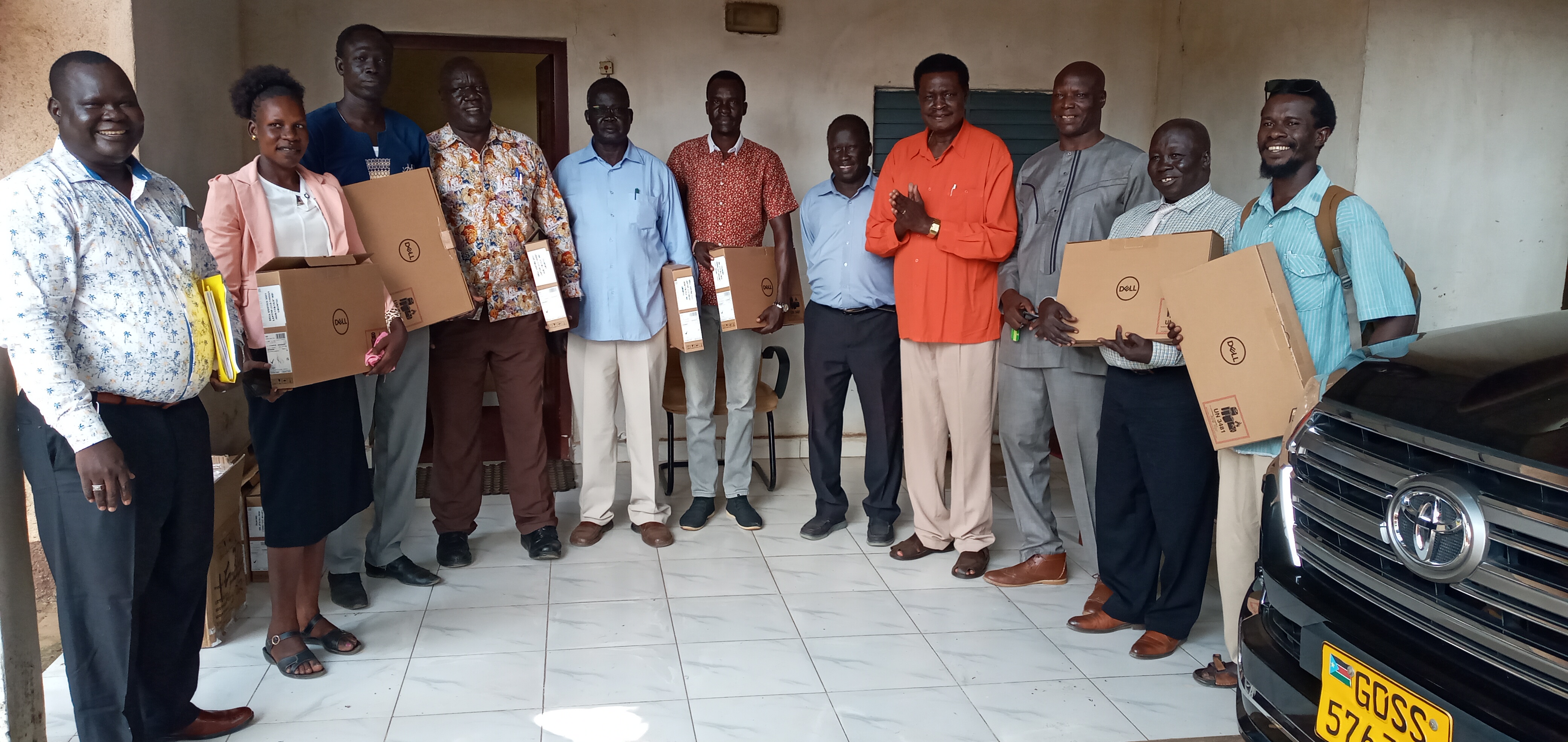
SAI South Sudan Auditor General and staff kicking-off digitalization with new laptops in July 2021, Juba headquarters.

GLOBAL FOUNDATIONS
PERFORMANCE SNAPSHOT
- Strategic partnerships
- Brokerage
- Measuring and monitoring SAI performance
- Advocacy and communications for behaviour change
- Supported the selection of IDC Independence Goodwill Ambassador
- Partnerships with IBP and IMF continued. Established with IPU.
- Established Global SAI Accountability Initiative
- Supported 15 SAIs in creating a country-level coordination plan
- 2020 GSR and GSR Gender Annex published, and website developed
- Gender data made available on SAI Capacity Development Database
- Integrated gender equality in annual communications & advocacy
- Introduced media platforms including media monitoring and social media aggregator to facilitate communications and outreach
A knowledge-based foundation for making informed choices on SAI support

GSR 2020 marks the 10th anniversary of the INTOSAI Global Survey
|
The Global SAI Stocktaking Report 2020 2020 was published in 2021. The report provides an analysis of performance and capacities of 178 SAIs that responded to the INTOSAI Global Survey 2020. The virtual platform used during the pandemics has created an opportunity to disseminate the results to a broader audience. Two launch webinars were held, and in addition, dissemination of results through the webinars has allowed for dissemination of data with regional and thematic focus. The report provides results on SAI context, independence, governance, audit work and capacity development. A special annex report, the Gender Annex, also brought results on SAI performance and capacities on gender, and was launched and published by bringing together stakeholders from the accountability chain. Global Survey Data dating back to 2010 have been compilated in a Global Survey database, to facilitate further analysis, including the next Global Survey. |
Advocacy and Partnering for Greater Impact
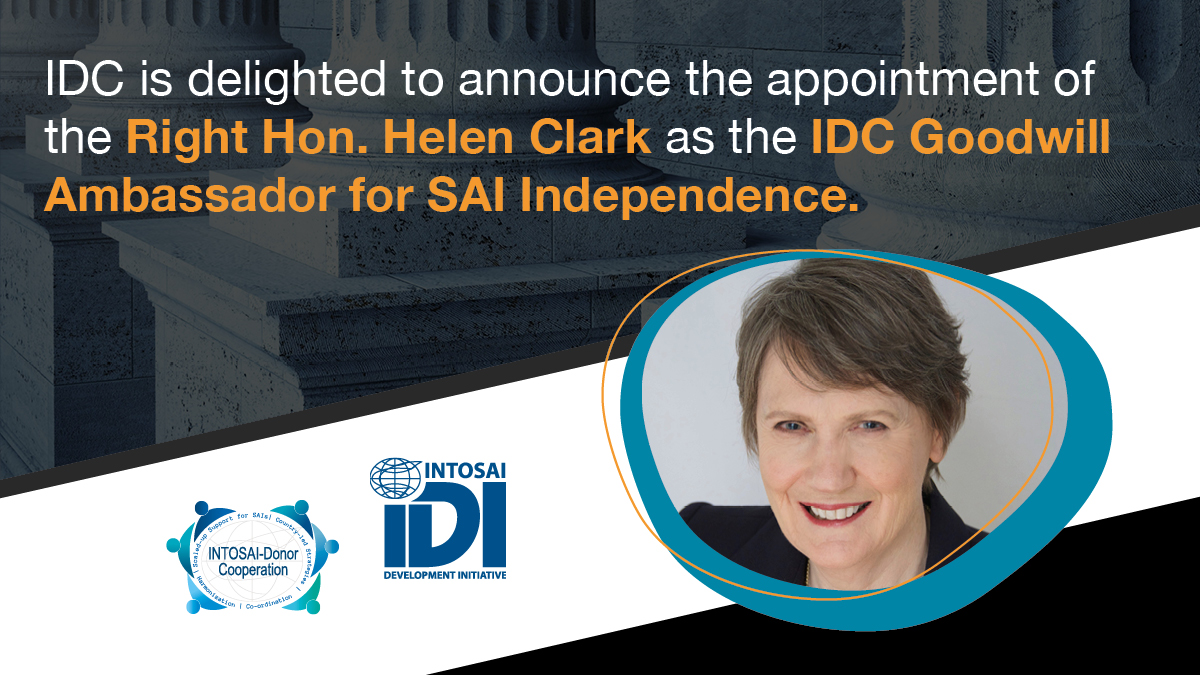
Fostering relationships to maximise SAI advocacy with global bodies and world leaders
Rt. Hon. Helen Clark, was appointed as the INTOSAI Donor Cooperation (IDC) Goodwill Ambassador for Supreme Audit Institution (SAI) Independence towards the end of 2021. As a world leader who served three terms as New Zealand’s Prime Minister and eight years as the first female head of the UN Development Programme, and is currently Chair of the Global Leadership Foundation, Helen Clark brings vast experience and gravitas to the role. Helen Clark’s appointment as IDC Goodwill Ambassador for SAI Independence is effective from 1 January 2022 for an initial term of three years.
Given IMF’s emerging interest in the work of SAIs, IDI published ‘The Role of SAIs in Auditing the Domestic Budget Support of IMF Emergency Financing’, co-authored with IMF staff. The paper was launched with a well-attended virtual event in September hosted by IDI and the IMF under the INTOSAI-Donor Cooperation banner, providing a launch pad for SAIs to share their experiences of auditing through COVID-19 and beyond, and for IDI to support the IMF’s capacity development programme ‘Check the Receipts’.
Coordinating the campaign activities of IDC and IDI’s SAI Independence team, GFU helped to facilitate the campaign to ramp up advocacy on SAI Independence through a variety of meetings, information packages and other advocacy tools throughout the year.
Cross-Cutting Priorities
IDI ensured its cross-cutting priorities were reflected through-out its work in 2021

SAI Culture and Leadership
All SAI development is a change process. This requires committed and effective leadership, and a recognition that change cannot happen without understanding and working within the culture of an organisation. IDI initiatives across all work streams, bilateral support and GFU engage with and support SAI leadership in change processes.

SAI Communications and Stakeholder Management
To deliver value and benefits for all citizens, and to embark on successful change processes, SAIs need to be outward-facing organisations, focused on effective communications and stakeholder management.
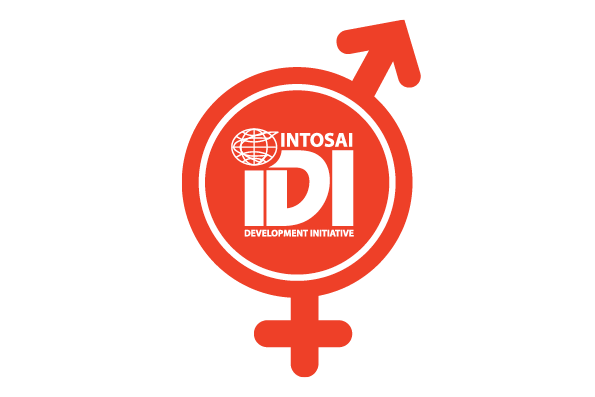
Inclusiveness and Gender
IDI’s vision is a world where SAIs are gender-responsive, leave no one behind and benefit everyone. Thus, IDI’s ambition is to step up IDI engagement on gender, intersectionality and inclusiveness. IDI supports SAIs to be gender responsive organisations and to conduct audits that contribute to gender equality. IDI seeks active collaboration with SAIs, INTOSAI bodies, relevant organisations and stakeholders, and continues its gender and inclusiveness engagement.
During 2021, the following examples show IDI’s engagement with leadership, stakeholders, gender and inclusiveness. They also emphasise how different cross-cutting priorities interlink with each other.
Making leadership work
Masterclasses for SAI leaders and mainstreaming leadership across IDI initiatives
MASTERY, one of the new initiatives under the Well-Governed SAIs work stream, aims at contributing to better leadership. MASTERY works with SAIs’ top management on specific topics of interest and potential. It provides SAI leaders with the opportunity to hear from IDI and external experts and practitioners. In a closed room setting, leaders can share and discuss challenges, provide advice and learn from each other. IDI launched MASTERY in 2021, focusing on how SAI leadership can promote SAI independence. Topics for 2022 will likely be inclusive leadership and strategic foresight. In addition, as its initiatives mostly fall within the prerogative of SAI leadership, the work stream elaborated a common approach for how to specifically engage and involve SAI leadership in a consistent and effective way.
Beyond focused initiatives on SAI leadership, such as in Mastery and SAI Young Leaders, IDI effectively engages leaders in different forms. In 2021, IDI collaborated with SAI leaders through SAI leadership and stakeholder meetings in IDI’s SDG 3.d. and TAI audits. IDI also involved SAI leaders in SAI Innovation events and in a global summit for audit quality where many of them were able to share inspiring success stories.

Working together to create impact
Engaging Stakeholders in IDI’s work
In the TAI audit initiative IDI cooperates with Association of Chartered Certified Accountants (ACCA) Global, GAVI the Vaccine alliance and International Budget Partnership (IBP). Working with a diverse set of stakeholders contributes to achieving desired outcomes and impact of TAI audits. Stakeholders provided valuable feedback to enhance the quality of the TAI guidance material and first-hand support to SAI teams in conducting the audit. With ACCA Global, IDI jointly developed three policy briefs on Leaving no one behind, Procuring at speed and Beyond keeping receipts and delivered a webinar on Leaving no one behind. GAVI the Vaccine alliance cooperated with IDI in developing the guidance and audit questions for auditing vaccine rollout. GAVI delivered sessions in TAI audit social learning on vaccine rollout for the participating SAI teams. IBP participated in TAI audit leadership conversation and spoke about the stakeholder engagement in conducting the audit.
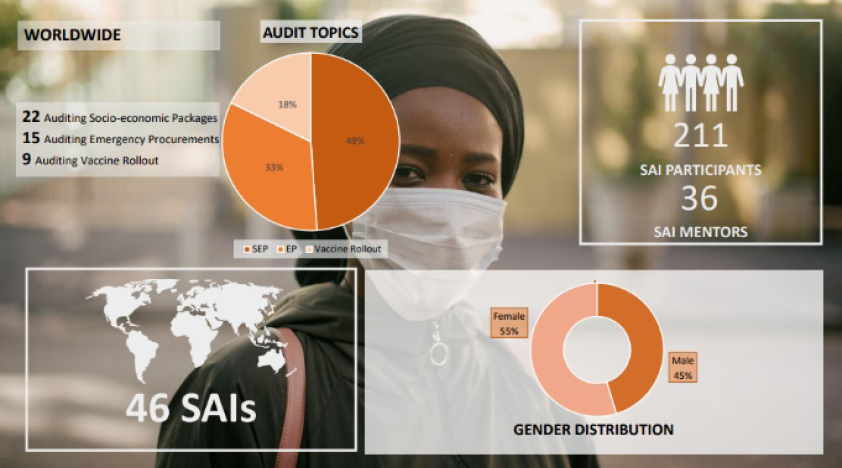
Contributing to positive change
Raising awareness on SAIs’ role in advancing gender equality and inclusiveness
In March 2021, IDI, together with UN Women and the IBP, hosted the online side event “Advancing Women’s Leadership in Public Finance” during the 65th UN Commission on the Status of Women. The event highlighted the need for gender parity and transformed leadership, including in SAIs, as one element of progress towards gender equality. IDI is convinced that engaging relevant stakeholders is necessary to raise awareness on the role of SAIs in advancing equality.
The need for increased awareness-raising and advocacy was also the driving force behind a new IDI gender video called “Gender Counts: How can SAIs contribute to accounting for gender equality?”. The launch of the video kicked off an extensive social media campaign during the 16 days of activism against gender-based violence. Each day, the campaign showcased IDI’s and the SAI community’s work and results on gender equality and inclusiveness.
Early evidence suggests, that IDI’s gender engagement and awareness raising efforts pay off. They contribute to influencing SAIs, the INTOSAI community and other stakeholders. There is increased engagement of SAIs and INTOSAI regions to contribute to gender equality and inclusiveness.
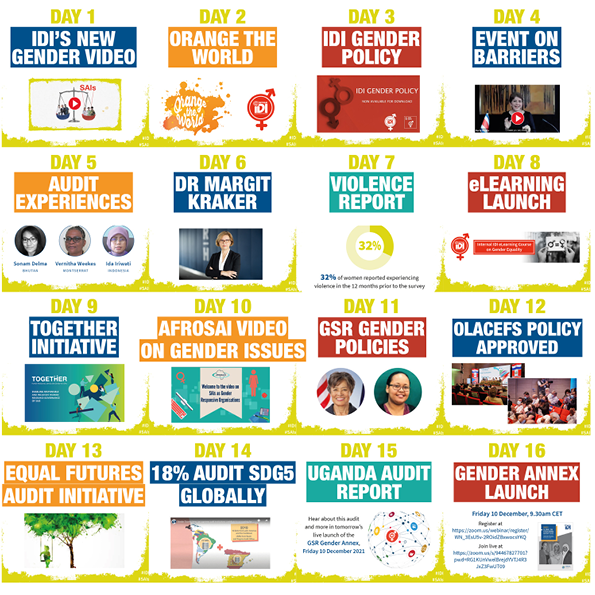
Working in Partnership
IDI aims to enhance the value and benefits of all support provided to SAIs, whether this is led by IDI, INTOSAI organisations, development partners or civil society organisations. Partnering with organisations that share IDI’s vision is fundamental to maximising IDI’s value for SAIs. During 2021, IDI engaged in strategic partnerships with the following organisations:
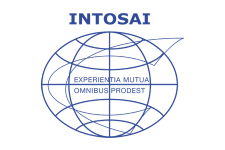
The International SAI Community has agreed on a shared vision and set of strategic priorities as set down in the INTOSAI Strategic Plan 2017-22. IDI partners with many INTOSAI bodies to support delivery of the INTOSAI plan, as well as the IDI Strategic Plan.
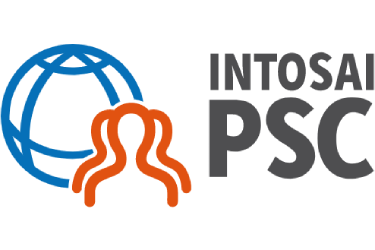
The INTOSAI Professional Standards Committee leads efforts to provide relevant and clear professional standards and guidance to Supreme Audit Institutions (SAIs). Under a signed terms of reference, the IDI cooperates with the PSC and its sub-committees on Financial Audit and Accounting (FAAS), Compliance Audit and Performance Audit in supporting SAIs in ISSAI implementation. Such cooperation includes working together on global public goods, professional education for SAI auditors, quality management and helping SAIs in conducting high quality audits.
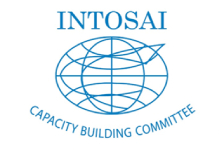
As the INTOSAI advocate and custodian for SAI capacity development, the Capacity Building Committee (CBC) is a key partner for the IDI. To maintain, promote and utilise SAI PMF for the advancement of SAIs, the CBC acts as custodian of SAI PMF and provides strategic guidance, whilst IDI takes the operational lead on SAI PMF support, coordination, and facilitation. The CBC and IDI also cooperate on auditor professional development initiatives, including IDI’s PESA-P Pilot and other initatives.
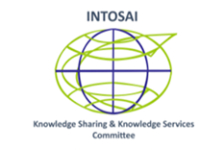
The Knowledge Sharing Committee (KSC) encourages SAI cooperation, collaboration, and continuous improvement. The KSC, and its sub-committees, have been a key partner for several IDI initiatives.
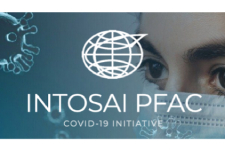
The INTOSAI Policy, Finance and Administration Committee (PFAC) ensures INTOSAI is an effective, accountable, and inclusive international organization. It coordinates preparation and monitors deliver of the INTOSAI Strategic Plan and oversees INTOSAI’s resources. PFAC and IDI collaboration includes on the INTOSAI Donor Cooperation and the ‘SAI Continuity During COVID-19’ grant.

The INTOSAI General Secretariat is INTOSAI’s permanent body, supporting all INTOSAI committees and activities. It acts as INTOSAI’s leading liaison with the United Nations. This makes it a key partner for IDI’s work with UN agencies on supporting SAIs to audit national efforts to implement the UN Sustainable Development Goals (SDGs). IDI and the General Secretariat also partner in efforts to advocate for greater SAI independence.
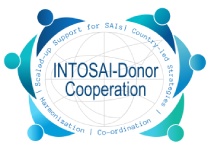
Comprising INTOSAI and 23 development partners, the INTOSAI-Donor Cooperation promotes SAI-led strategies, coordination and harmonisation of support to SAIs, and scaled-up support for SAIs. IDI plays a key role in both implementation and coordination.
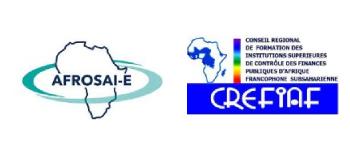
IDI, AFROSAI-E and CREFIAF have a long-term partnership to support the SAIs of DRC, Eritrea, Guinea, Madagascar, Niger, The Gambia, Togo, Sierra Leone and Zimbabwe. The programme empowers SAIs in urgent need of support and development to enhance their capacity and to improve their performance, to be able to make a difference to the lives of the citizens.
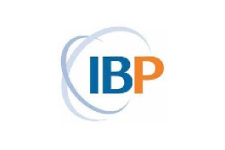
IDI partners with the International Budget Partnership (IBP) to advocate for independent and effective SAIs as essential to good public budgeting, effective governance and reducing poverty; and to support effective engagement between SAIs, legislatives and civil society in order to enhance accountability, audit impact and make a difference to the lives of citizens.
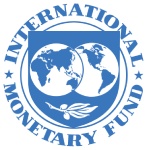
The IMF and IDI share a vision of enhanced transparency and accountability in the use of emergency funds through relevant, timely, published audit reports; and independent, credible and effective SAIs contributing to good financial governance, addressing governance vulnerabilities including corruption.
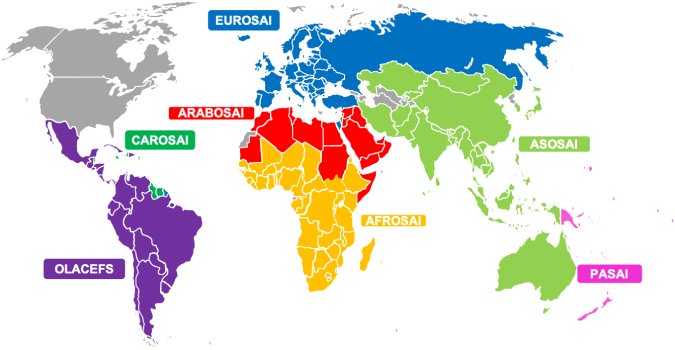
INTOSAI Regional Organisations
IDI works in close cooperation with AFROSAI, ARABOSAI, ASOSAI, CAROSAI, EUROSAI, OLACEFS and PASAI, as well as sub-regional bodies AFROSAI-E, CREFIAF and ASEANSAI. The regions provide a crucial link between IDI’s global perspective, and the specific strengths, challenges and needs of their member SAIs. These bodies are key partners for the delivery of many IDI initiatives.
DELIVERY IN THE NEW NORMAL
DELIVERY IN THE NEW NORMAL
While the pandemic continued during the year, IDI braced itself for the new normal. Harnessing its early forays into digital technologies and digital education, IDI responded to COVID-19 with scaled up operations on digital platforms. Digital technologies have helped IDI and stakeholders including participants not only in terms of business continuity, but also in terms of a wider outreach, scaled up operations and convenience of accessing learning resources from different locations and in different time zones. IDI’s systems were upgraded to manage a larger number of users and courses for the initiatives. Recognising the need to further enable the SAIs in the use of digital tools IDI launched two dedicated initiatives under the Well Governed and Relevant SAIs work streams: pICTure and LOTA. The IDI Learning Management System was further improved in terms of adding new plugins, improving accessibility and data analytics features.
With travels gradually opening up, IDI analysed the feasibility and extent of returning to some in person delivery through organising onsite events. Going forward, a hybrid approach was planned towards the end of the year. In person events will be organised on the basis of being purpose driven, inclusive, safe and realistic.

CONTINUALLY IMPROVING IDI
Improved Controls and Procedures
During the year, IDI updated its Internal Control System to reflect the changes in the operations and processes since the previous version from 2014. Similarly, the IDI Procurement policy was updated. IDI Financial Manual was also revised to reflect current procedures.
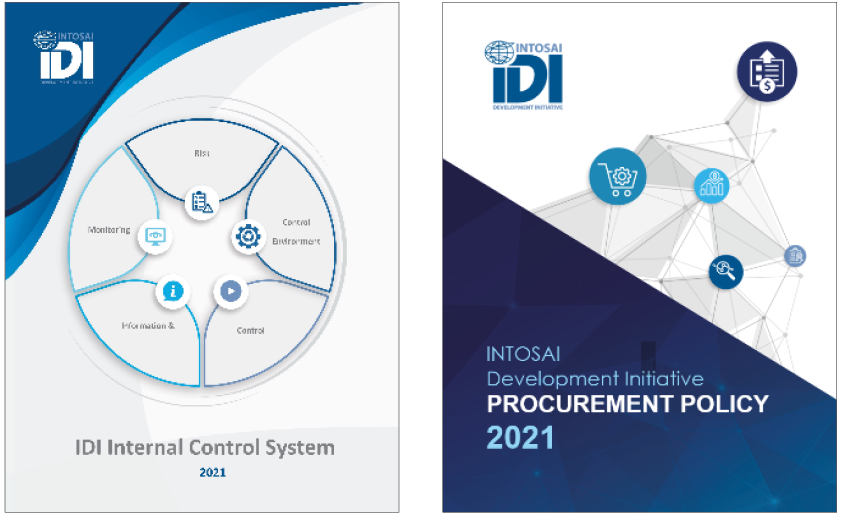
Accountability and Learning
Evaluation of the SAI PMF Implementation Strategy 2017-2022 was conducted in 2021. The evaluation provided recommendations in the following areas for the IDI and INTOSAI CBC:
- Greater involvement of INTOSAI regions in SAI PMF activities
- Encourage donors to provide funding for SAI PMF assessments
- Assess synergies between SAI PMF and PEFA assessments
- Encourage SAIs to carry out SAI PMF assessments
- Streamline the Independent Review procedure
As part of planning for the next IDI Strategic plan, a mid term evaluation of the IDI Strategic Plan 2019-2023 was commissioned.
A big YES to gender and inclusiveness in IDI
Leading by example to remain credible in supporting others. This is one of IDI’s strategic priorities on gender and inclusiveness issues (see: IDI Gender Strategy). Thus in 2021, IDI continued its gender journey while broadening to better embrace intersectionality as a principle and inclusiveness more generally (see: IDI Gender Policy in 2021).
To pursue IDI’s path towards mainstreaming gender and inclusiveness, IDI commissioned an assessment of IDI’s situation in the areas of recruitment, career progression and salaries from a diversity, gender and intersectionality perspective. An external expert started work in November 2021. As always, IDI made sure to engage the entire organisation. IDI staff will be involved in developing an action plan based on findings and recommendations of the report.
The report will be finalised in 2022. An executive summary will be available on IDI’s gender and inclusiveness website. Evidence already shows that IDI is a frontrunner on gender equality but even more can be done to fully embrace diversity and inclusiveness.
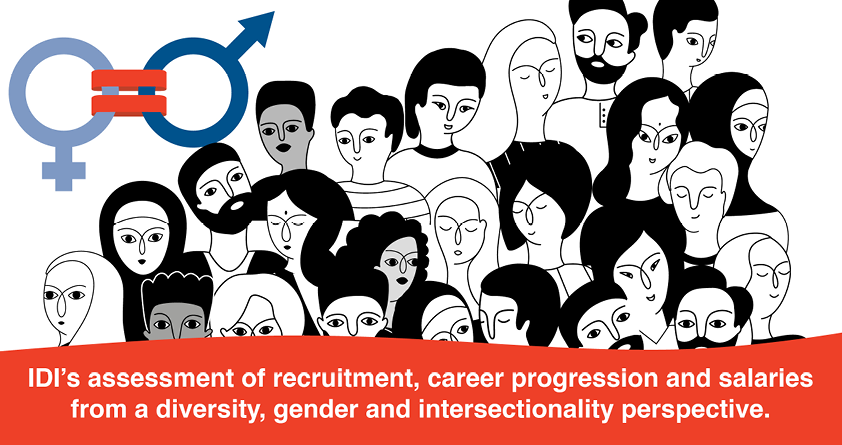
IDI RESOURCING
The financial situation of IDI remains sound. Total expenditure during 2021 was below budget at NOK 67,9 million reflecting the significant impact by the prolonged pandemic on IDI’s travel activities which were halted during most of 2021. IDI’s delivery mechanisms continued to be through virtual delivery of support to SAIs. The main portion of the expenditures in IDI work streams were in the departments for SAI Governance and Professional and Relevant SAIs.
IDI relies on funding from donors and SAIs, as well as significant in-kind contributions from SAIs for resourcing its capacity development work. In 2021 IDI brought forward NOK 32,2 million. This convention to be followed uniformly and had gross receipts of NOK 66,0 million. IDI’s total available funding was NOK 98,2 million. Recognised revenues and expenditures were below budget and resulted in a gross carry forward of NOK 30,3 million. After deduction of planned repayment of interest and grants to donors, NOK 24,3 million was carried forward to 2022. Accumulated funding from INTOSAI of NOK 1,5 million was recorded in the financial statements as a formal part of IDI’s reserves.
In-kind support from SAIs and other partners in 2021 amounted to almost 2002 days, estimated at NOK 8,7 million. This is equivalent of 9 full time staff equivalents, or 13% of IDI’s 2021 expenditure. COVID-19 continued to make mobilisation of in-kind support challenging, due in part to the lack of face to face events through which most SAI in-kind support was received. By comparison, in 2019 and 2020 IDI mobilised 2483 days and 1600 days support valued at around NOK 10,0 million and NOK 6,9 million respectively.
IDI EXPENDITURES IN NOK MILLION
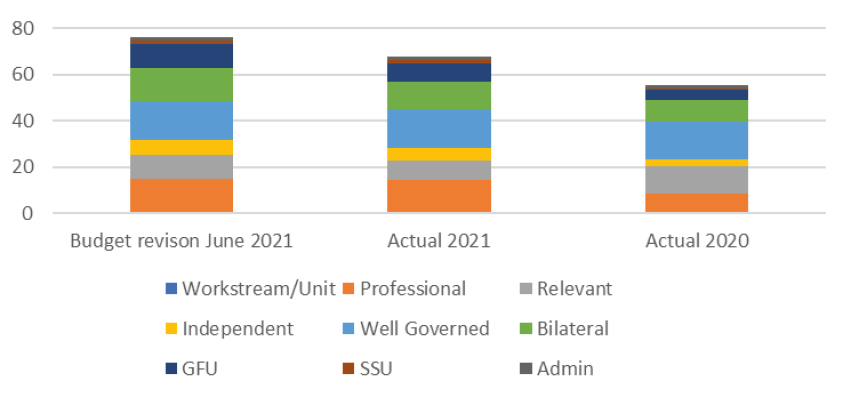
IN-KIND SUPPORT
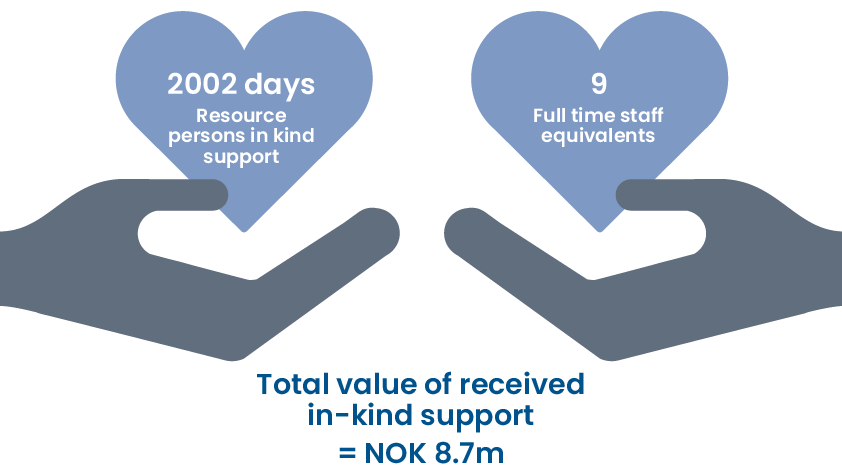
Appreciation For Our Partners
IDI wishes to thank all our partner organisations for their financial and in-kind support.
Core Funding Partners
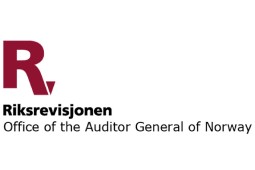
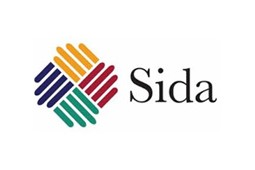

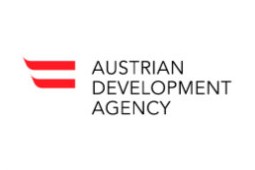
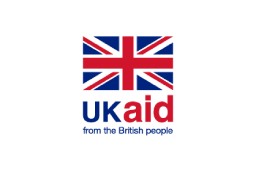
Earmarked Funding Partners
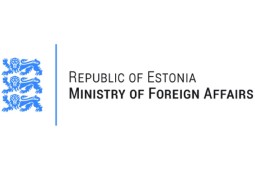
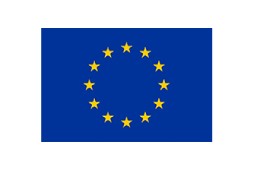
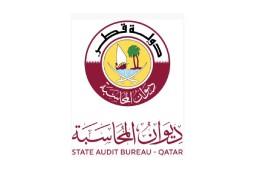
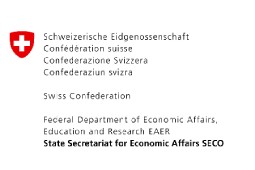
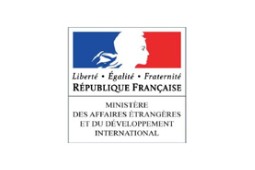
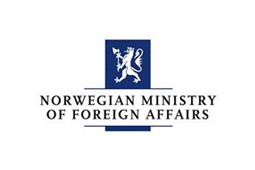
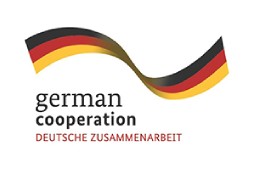
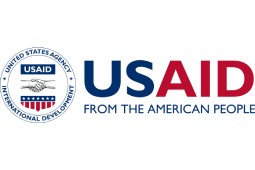
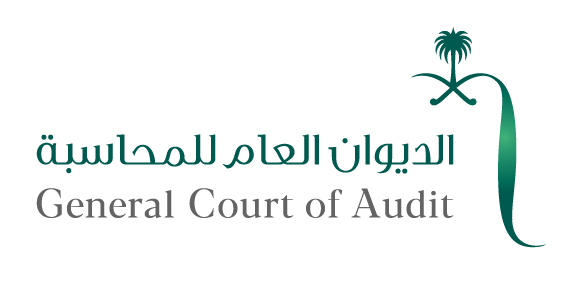
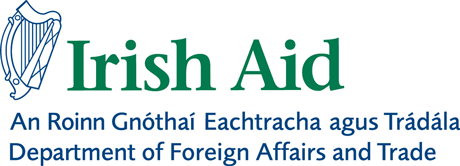
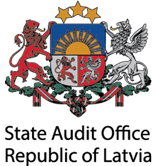
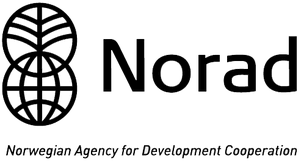
International SAI Community
- The International SAI Community has agreed on a shared vision and set of strategic priorities as set down in the INTOSAI Strategic Plan 2017-22. IDI partners with INTOSAI bodies to support delivery of the INTOSAI plan, as well as the IDI Strategic Plan. This includes the INTOSAI Governing Board, General Secretariat, Policy, Finance and Administration Committee, Capacity Building Committee, Knowledge Sharing Committee and Professional Standards Committee (including its Financial Audit and Accounting, Performance Audit and Compliance Audit sub-committees).
- IDI works in close cooperation with the regional organisations: AFROSAI, ARABOSAI, ASOSAI, CAROSAI, EUROSAI, OLACEFS and PASAI, and the sub-regions AFROSAI-E, CREFIAF and ASEANSAI. The regions provide a crucial link between IDI’s global perspective, and the specific strengths, challenges and needs of their member SAIs. These bodies are key partners for the delivery of all IDI initiatives. IDI, AFROSAI-E and CREFIAF partner to provide accelerated peer-peer support to nine SAIs in challenging environments.
- IDI had agreements with the SAIs of Argentina, Finland, Indonesia and Tunisia who provide dedicated human resources to IDI as in-kind support
- Over 50 SAIs from across the world provided in-kind support to IDI initiatives, amounting to around 1600 expert days
Other Strategic Partners
- IDI’s Global Foundations Unit continues to work with the INTOSAI-Donor Cooperation to scale-up and enhance the effectiveness of support to SAIs
- IDI and the International Budget Partnership work together under a Strategic Partnership Agreement to advocate for and strengthen engagement between SAIs and Civil Society Organisations
- IDI, the INTOSAI Capacity Building Committee, and the SAI PMF reference group partner to maintain and promote SAI PMF for the benefit of SAIs
- IDI and the IMF are working together, and supporting each other’s initiatives, on strengthening the audit of the use of COVID-19 emergency funding
